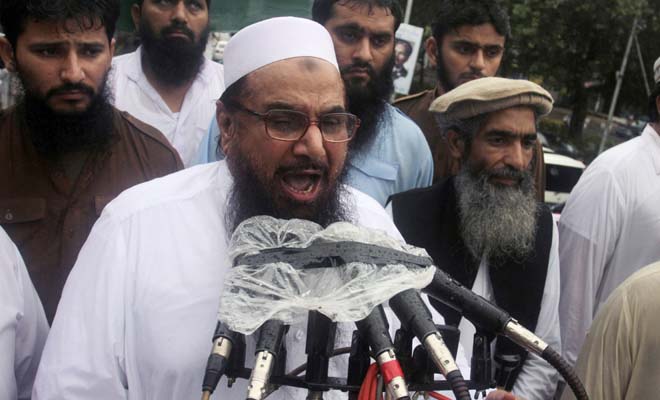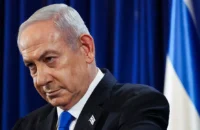by KHALED AHMED
On July 17, Lashkar-e-Taiba founder Hafiz Saeed was taken into custody by the Counter-Terrorism Department of Punjab. This occurred a mere two days after an anti-terrorism court in Lahore had granted pre-arrest bail to Saeed in a case pertaining to his organization’s alleged illegal use of land for its madrassa. That case apparently came about as an “under pressure” Pakistan initiated “23 cases against Hafiz Saeed and his 12 aides over terrorism-financing.”
Seized upon by all major Indian and Pakistani newspapers, the Counter-Terrorism Department defended its actions then by claiming all actions were in accordance with U.N. sanctions. In its coverage of the incident on July 4, Pakistan’s Daily Times newspaper said: “The counter-terrorism department (CTD) said it had launched 23 cases against Hafiz Saeed and 12 of his aides for using five trusts to collect funds and donations for Lashkar-e-Taiba (LeT). Two banned LeT-linked charities, Jamaat-ud-Dawa (JuD) and Falah-e-Insaniat Foundation (FIF), were also targeted, the department said in a statement. ‘All the assets of these organizations and individuals will be frozen and taken over by the state,’ said a counter-terrorism senior official, speaking on the condition of anonymity because he was not authorized to speak publicly.”
Nowhere in the report, or the CTD statement, was there any mention of the parallel legal system Saeed had been spearheading across the country in violation of Pakistan’s laws. The shocking revelations had been made by daily The News in 2016, with the newspaper reporting Saeed had been running stealth courts in violation of the Pakistan’s Constitution: “The supra-constitutional Sharia courts, established by Jamaatud Dawa, operate across the country and only the Lahore court of this parallel judicial system has issued verdicts in 5,550 cases, including murder trials.”
FATF fiat
The pressure on Islamabad to “do something” now has largely come from the Paris-based Financial Action Task Force (FATF), which last year placed Pakistan on its “grey list” of countries with inadequate controls over money-laundering and terror-financing. The international watchdog gave Pakistan till October 2019 “to improve its efforts against terrorism-financing” if it didn’t want to be blacklisted.
In 2012, the United States had placed a $10 million bounty on Saeed’s head, to Indian approval. Seven years later, Pakistan finally took action. Washington, in an apparent quid pro quo, responded by declaring the Balochistan Liberation Army—long seen as an India-backed ‘non-state actor’ used to target Pakistan—a terrorist organization.
New Delhi’s desire to see Hafiz Saeed in jail is no secret. Following the 2008 Mumbai attacks, he was prominently featured on a list of “most wanted” given by India to Pakistan. This was even supported by press coverage in Pakistan.
On Nov. 12, 2012, Geo TV anchor Kamran Khan revealed that Pakistani officials had told Anti-Terrorism Court Judge Chaudhry Habibur Rehman that “the terrorists who attacked and killed over 166 innocent people in Mumbai on Nov. 26, 2008, belonged to Lashkar-e-Taiba and that they had trained at various cities of Pakistan. The mastermind of this attack, Zakiur Rehman Lakhvi, was under trial at Adiala Jail in Rawalpindi.” Lakhvi, however, was released due to “lack of evidence” on April 9, 2015 on orders of the Lahore High Court.
Saeed’s Taiba was also accused of being involved in the planning and execution of the Mumbai attacks by Pakistani-American David Headley (aka Daud Gilani). A documentary produced by American broadcaster PBS’ Frontline gleaned this info from a typed “memoir” reportedly compiled by Headley. In it, Headley claims he joined Lashkar-e-Taiba before September 11, 2001 following a meeting with Saeed in Lahore. He also claimed he was part of the reconnoitering team for the Mumbai attacks, which would never have occurred if he hadn’t laid out the “mission map.”
Troubling truths
Despite the media coverage, Saeed’s detention this month is by no means the first time he has been imprisoned. In February 2017, the Dawa founder was confined to his house on court orders, resulting in mass protests by his supporters against his detention. While the demonstrators lauded Saeed’s “charitable works,” no one dared to mention the damning evidence linking him to acts of terrorism in India and India-Occupied Kashmir. A seemingly inconsequential statement of Saeed’s perfidy by then-defense minister Khawaja Muhammad Asif showed why so many were hesitant to speak out.
During a trip to Germany, Asif committed the “blasphemy” of saying that “Hafiz Saeed can become a threat to society.” This squared with the global condemnation of Saeed. In Pakistan, however, devotion to the ‘philanthropist’ ran deep. Even his unthinkable act of running private courts within Pakistan had been forgiven.
Predictably—and perhaps also because of then-ruling Pakistan Muslim League (Nawaz)’s failing fortunes—Asif’s Germany statement prompted a pro-Saeed earthquake. The dreaded rightwing Defense of Pakistan Council fired a broadside at the PMLN’s government that was quickly embraced by opposition forces seeking a swift dissolution of Parliament. They claimed that instead of “speculating” whether Saeed could become a threat, Asif should have instead pivoted to the atrocities committed against Muslims in India-Occupied Kashmir. Pakistan-administered Kashmir’s former prime minister Sardar Muhammad Atique said Asif’s words were appeasing India. Pakistan Tehreek-e-Insaf leader Mahmoodur Rasheed, meanwhile, claimed it proved the Sharif government was “defensive” on India and the U.S. and made Asif sound more like the defense minister of India rather than Pakistan.
Mainstreaming menace
In September 2017, it had become clear that unless vested interests intervened, the dubious empire of Hafiz Saeed was set to end and the process of “mainstreaming” recommended by retired generals on talk shows had made shipwreck. The Dawa head had, a month earlier, launched the Milli Muslim League, a political party that contested the by-elections in Lahore’s NA-120 constituency, bagging 5,822 votes—over four times that of mainstream Pakistan Peoples Party—but still losing to the PMLN candidate.
In response, the Election Commission of Pakistan sought guidance on whether proscribed outfits could be allowed to contest polls. Pakistan’s Foreign Office, under then-foreign minister Khawaja Asif, urged against it and noted it had received negative feedback from diplomatic missions across the world over the MML’s by-poll run.
The Interior Ministry also came out against allowing Saeed and his cohorts to contest elections: “There is evidence to substantiate that Lashkar-e-Taiba (LeT), the Jamaatud Dawa and Falah-e-Insaniat Foundation (FIF) are affiliates and ideologically of the same hue, and [therefore] the registration of the MML is not supported.” Dawa, the ‘charitable’ arm of Taiba, had been designated a terrorist group by the U.N. Security Council as a “supporting agent of the banned Lashkar-e-Taiba” following the Mumbai terror attacks.
The same “mainstreaming” being peddled on TV had allowed Saeed to sink his hooks into many aspects of Pakistani society. His various organizations operated hundreds of schools and colleges, securing support among the youth. This clout helped it weather negative fallout, such as Saeed’s running running of private “shariah” courts. The state even provided security to Saeed and enlisted his help in the “renewal” of Sindh and Balochistan, regions that had been depredated by state neglect and local rebels.
The PMLN, on its last legs, managed to highlight the negative consequence of “mainstreaming”: instead of de-radicalizing the declared terrorists the process sought to further radicalize society and undermine the power of the state under the Constitution. The “indirect” and “implied” Chinese warning at a BRICS summit in July 2018—where it joined other nations in expressing concern over the security threat posed by groups like Taiba—had to be heeded.
Lashkar as Jamaat
Hafiz Saeed’s rise to prominence did not come as a surprise to Pakistan observers. In 2005, Saeed would routinely criticize the government’s policies. After establishing Chauburji in Lahore as his new home base, his profile had never been higher. Urdu-language newspapers felt obliged to print his almost daily diatribes against “the misdirection of the country.” He was one of three men—alongside Masood Azhar of Jaish-e-Mohammad and Fazlur Rehman Khalil of Harkatul Mujahideen—who was apparently exempt from any punishment doled out to ‘terrorists.’
But while public awareness of Saeed was rising, his standing within Dawa was on the wane. Reports claimed a group of disgruntled Dawa bigwigs, led by Maulana Zafar Iqbal, had revolted against Saeed and formed Khairun Naas (People’s Welfare), a new splinter faction. Iqbal, the reports claimed, had visited Saudi Arabia to seek support to consolidate his splinter party. Saeed, it appeared, was fighting for his political survival.
From Simla to Sargodha
It is worthwhile to look at how Hafiz Saeed, a Kashmiri gujjar whose family lived in Simla before Partition, and who grew up in Sargodha, rose to the lofty position of Taiba chief. Saeed’s father, Maulana Kamaluddin, was a religious scholar, as was his uncle and eventual Taiba leader Maulana Hafiz Abdullah. Abdullah’s sons, Abdur Rehman Makki and Abdul Mannan, married the sisters of Hafiz Saeed, with Makki later becoming the second-in-command at Lashkar-e-Taiba.
Saeed graduated from Sargodha Government College and later obtained his postgraduate in Arabic and Islamic Studies from Punjab University. During his stay at the varsity, he was a nazim of the Islami Jamiat Tulaba, the student wing of the Jamaat-e-Islami. Former parliamentarian Javed Hashmi won the Punjab University Student Union elections under Saeed’s leadership—perhaps explaining why he urged the U.S. to withdraw its bounty on the Taiba head—and rose on the Pakistani political scene.
According to Nida-e-Millat magazine, Saeed participated in the election campaign of Jamaat-e-Islami in 1970 but was put off by its politics following their loss. He further turned against democracy after being traumatized by the fall of East Pakistan in 1971.
After graduation from Punjab University in 1974, Saeed was appointed lecturer at Lahore’s University of Engineering and Technology in the Islamiat Department. During his time as faculty at UET, Saeed traveled to Saudi Arabia for higher studies, graduating from King Saud University, Riyadh. He is said to have been close to Saudi scholar Sheikh Abdul Aziz bin Baz, who was the first to issue a fatwa for jihad in Afghanistan in 1979.
Following his return to Pakistan, Saeed was selected as a research scholar at the Council of Islamic Ideology by a panel of High Court judges. He also continued in his role as lecturer at UET.
Perhaps due to his closeness to Baz, Saeed turned to jihad following the 1979 fatwa, joining Afghan mujahideen Abdur Rasul Sayyaf’s training camp. It was at the camp that he met Abdullah Azzam, a founding member of Al Qaeda who had also taught Osama bin Laden. Saeed even admits that he met bin Laden several times during his training. His efforts paid off; in 1986, the teachers of UET’s Islamiat faculty founded the Markaz Dawat wal-Irshad, an Ahle Hadith organization dedicated to raising armies for the jihad in Afghanistan. In 1990, when Hafiz Saeed set up Lashkar-e-Taiba, it was in consultation with these professors. By 2001, Taiba was boasting it had killed thousands in India-Occupied Kashmir. Saeed even claimed that the group’s fighters had also fought jihad in Bosnia and Chechnya.
Nuclear scientists and Saeed
Paul L. Williams, American journalist who advises the FBI, alleges in Osama’s Revenge: the Next 9/11, that Pakistani nuclear scientists and the Lashkar-e-Taiba helped Osama bin Laden equip Al Qaeda with miniaturized nuclear weapons and “dirty” nuclear explosives. Citing a Dec. 20, 2002, BBC News report, he claims Dr. Abdul Qadeer Khan’s Kahuta Laboratories had been clandestinely funded by Saudi Arabia, which was interested in developing an “Islamic Bomb.” Then-prime minister Benazir Bhutto, too, had Dr. Khan visit North Korea to purchase 12-14 Nodong ballistic missiles.
Adding fuel to this claim, Khan has appeared at Lashkar-e-Taiba rallies organized by Hafiz Saeed alongside other nuclear scientists, including Sultan Bashiruddin Mehmood, former director of the Pakistan Atomic Energy Commission. This hobnobbing allowed Saeed to come within orbit of the “deterrence” assets Pakistan has to safeguard. Obviously, Saeed’s connections to Saudi Arabia—which enjoys much traction with Islamabad—may also have played a role in his seeming immunity from legal action.
In 2003, Islamabad officially banned Lashkar-e-Taiba, resulting in its rebranding as the Jamaatud Dawa, which often served as a coordinating agency for pro-Al Qaeda networks in Pakistan. One prominent example of this is the discovery of Osama bin Laden’s lieutenant, Abu Zubaida, on Feb. 2, 2002, from a safe house owned by Hafiz Saeed in Faisalabad.
Global squeeze
In January 2017, Islamabad was pressured by a global anti-terrorism consensus to restrain Hafiz Saeed under Section 11-EEE(1) of the Anti-Terrorism Act, 1977. He was placed under house arrest at Masjid Qadisiyyah in Lahore, named rather insultingly after the location where Islam defeated the Sasanian Empire during its first period of conquests. He was later shifted to a more comfortable residence in Johar Town.
Throughout this process, he continued to enjoy support across Pakistan. His funding and anti-India tirades were sufficient to earn him seeming immunity in cases—such as the Mumbai attacks or the illegal courts—that would’ve earned him a life in jail, or even execution, in any other context.
Expanding the domestic domain
At the time, Saeed was rumored to have 200,000 men deployed in Tharparkar, Sindh and Balochistan to “conquer” the marginalized communities of Pakistan: Hindus who “converted” because of his “kindness” and the Baloch who “appreciated” his help. He headed the largest charity in Karachi, where he also operated a university, in addition to thousands of schools and kindergartens all over Pakistan.
In July 2016, Dawn published a report on a meeting between then-Prime Minister Nawaz Sharif and ISI chief General Rizwan Akhtar in which it claimed they discussed how the impunity enjoyed by non-state actors such as Masood Azhar and Hafiz Saeed was diplomatically isolating Pakistan. The “Dawn leaks” report was roundly slammed by the military and resulted in a mass campaign against Dawn.
In response, Saeed told Dunya News in October 2016 that even though the government and the Army were simpatico on India, P.M. Sharif’s advisers were making him “embrace the general in his arms while tripping him up down below with his foot.” Meanwhile, Dawa continued to pledge support to militancy. As reported in daily Jang on June 10, 2006, the organization held funeral prayers in absentia in Lahore for [Islamic State founding member] Abu Musaab al-Zarqawi, and condemned Pakistan’s Foreign Office for saying his death in Iraq was an achievement in the war on terror. It wasn’t alone. In the National Assembly, the clerical Muttahida Majlis-e-Amal also demanded funeral prayers for Zarqawi but was denied by the Speaker of the House, with a Jamaat-e-Islami leader claiming Islamabad was reluctant to call the militant a martyr as “that could offend Washington.”
The Pathankot episode
In January 2016, a terrorist attack took place at the Pathankot Air Force Station, a part of the Western Air Command of the Indian Air Force. Four attackers and two security forces personnel were killed in the initial battle, with an additional security force member dying from injuries hours later. Indian reaction to the attack was intense despite Pakistan’s denials of any involvement.
Babar Sattar wrote in The News on Oct. 8, 2016: “Pathankot highlighted that actions of non-state actors can trigger a full-scale war between nuclear-armed India and Pakistan. Uri is establishing that it is non-state actors that are now in control of the fate and fortune of the Subcontinent and not the two states. It is time to snap out of our present state of insanity. Let us not allow India’s fighting words to prevent us from undertaking a Machiavellian appraisal of our national security doctrine and how we have transformed homebred nonstate actors into the biggest threat to our security.”
Disbelieving world
The world didn’t buy Pakistan’s denial on Pathankot just as it believed that Hafiz Saeed had masterminded the Mumbai attack of 2008 and, led by the U.S., wanted Pakistan “to prevent Hafiz Saeed from moving freely in the country, freeze the assets of the groups associated with him and stop allowing LeT from acquiring weapons—in accordance with U.N. Security Council Resolution 1267/1989.” In Pakistan, however, Dawa was still considered a separate entity from the banned Lashkar-e-Taiba and Hafiz Saeed remained a highly respected person because of his jihadi slogans against the “enemies of Pakistan,” which at that moment were the U.S. and India.
International reports about the “connectivities” of Dawa with Al Qaeda and Hafiz Saeed’s past associations with the founders of Al Qaeda were rarely regurgitated for the Pakistani audience. Revelations about the various sojourns of Osama bin Laden before his death—to Kohat, Swat, Karachi and Abbottabad—and his phone calls to Hafiz Saeed were roundly dismissed without comment. As titular head of the Defense of Pakistan Council of 40 religious parties, Saeed headed one of the six centers of power in a slowly imploding state. He was the national symbol of Pakistan’s defiance of its erstwhile ally, the U.S.
Pride and honour breed defiance no matter what the odds. Defiance in foreign policy when no one in the world backs you is called isolationism, which is another name for defeat in the present international order. When Pakistan’s nonstate actors defeated the Soviet Union the world was on Islamabad’s side in the proxy war; in Kashmir, the world was not with Pakistan, and Pakistan failed at humbling India. The blowback from the planned “victory” against the U.S. was far more lethal than the blowback from the victory against the Soviet Union. The problem was not only that foreign policy was not being handled by Pakistan’s Parliament, but that it was instead spearheaded by elements who had their own agenda for the country. With Saeed’s latest arrest, perhaps that agenda is finally coming to an end.
Khaled Ahmed is a Consulting Editor, Newsweek Pakistan.



























